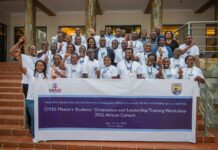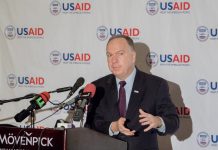
The engineer responsible for the execution of a school building project in the Bawku West District, which recently saw some community members reject some bricks on grounds of substandard quality, has fought back for the contractor, saying his boss did not intend to use the bricks for the project.
The community members, trained by the Community Development and Advocacy Centre Ghana (CODAC-Ghana) to hold duty bearers accountable, told the media early in October, this year, how they discovered about two hundred poor-quality blocks among the bricks the contractor had gathered to construct a three-unit classroom block at Guzongo.
The Chairman of the Guzongo Unit Committee, Daniel A. Atiah, had said a team of natives rejected the blocks and that the contractor, Sebani Enterprise, had to look elsewhere for new bricks to replace the rejected ones to complete the project. But in a strong rebuttal, the engineer, Achow Peter Atigah, said the statement made by the team was a fabrication.
“They should know that something happened to those blocks. We explained to them that we moulded the blocks and rain beat them that same day. We were not going to use them. In our own wisdom as a construction firm, we put those blocks aside and looked for another set of blocks to complete the work.
“So, the team cannot say that they exposed us. The statement they put there is false. The contractor told the site engineer not to use those blocks because their sizes had reduced and they were no longer strong enough after the rain beat them the same day they were moulded,” Mr Atigah told Starr News.

Trained to Monitor and to Mention
The community members were trained under a project called Ghana’s Strengthening Accountability Mechanisms (GSAM).
GSAM is a five-year project sponsored by the United States Agency for International Development (USAID) to “enable citizens to hold their local authorities accountable and demand improved service delivery.”
A confederation of three organisations is implementing the project in 100 districts across Ghana. They include Care International in Ghana, Oxfam in Ghana and the Integrated Social Development Centre (ISODEC). CODAC Ghana is executing the project with Oxfam in Ghana in three districts in the region, namely Bawku West, Garu-Tempane (now two separate districts) and Pusiga.
“Basically, what we do is to train citizens on how to monitor capital projects in their various communities. Capital projects are buildings— buildings like schools, clinics, whatever infrastructure they are going to build in their communities. Every year, we identify two communities where the assembly has projects to implement. We pick the assembly’s annual plan and budget, look at the projects they have and we pick two communities from there to monitor.
“We are monitoring quality and making the assemblies transparent and accountable. From the contracting stage, the community is involved in the project such that when the assembly is taking the contractor to site the community members are present. And it will be spelt clearly the type of project they are going to do in that particular community. We push them to ensure that they take part in the decisions that affect them,” the Executive Director of CODAC Ghana, Issahaku Bukari, told Starr News at the close of a town hall meeting organised recently in the Bawku West District by his outfit in partnership with Oxfam in Ghana.
Guzongo Community Commended for Asking for More
The Upper East and Northern Zonal Project Officer for the GSAM Project, Cynthia Bawa, featured in the town hall meeting.
Whilst encouraging co-participants to not only monitor the projects being implemented in their areas but also to lobby for projects on behalf of their communities, she also commended the people of Guzongo for demanding a conducive classroom accommodation for the children in the community.
“I’m very happy to mention that Guzongo community did something very wonderful. I was there yesterday and I spoke to one of the community monitors. What I heard was that they are happy, they are very satisfied with the project that is being given them, but they think it should go beyond the 3-unit classroom block because of the increased number of children. I was so excited.
“So, I asked him, ‘So, what are you doing as citizens, as community members, about this situation?’ He told me [that] through the project they had been educated to lobby the assembly; so, they’re doing that. And I was so, so excited. It’s going to be one of our success stories we will be telling in our news reports,” said Ms Bawa.
Source: Ghana/Starrfmonline.com/103.5FM/Edward Adeti




